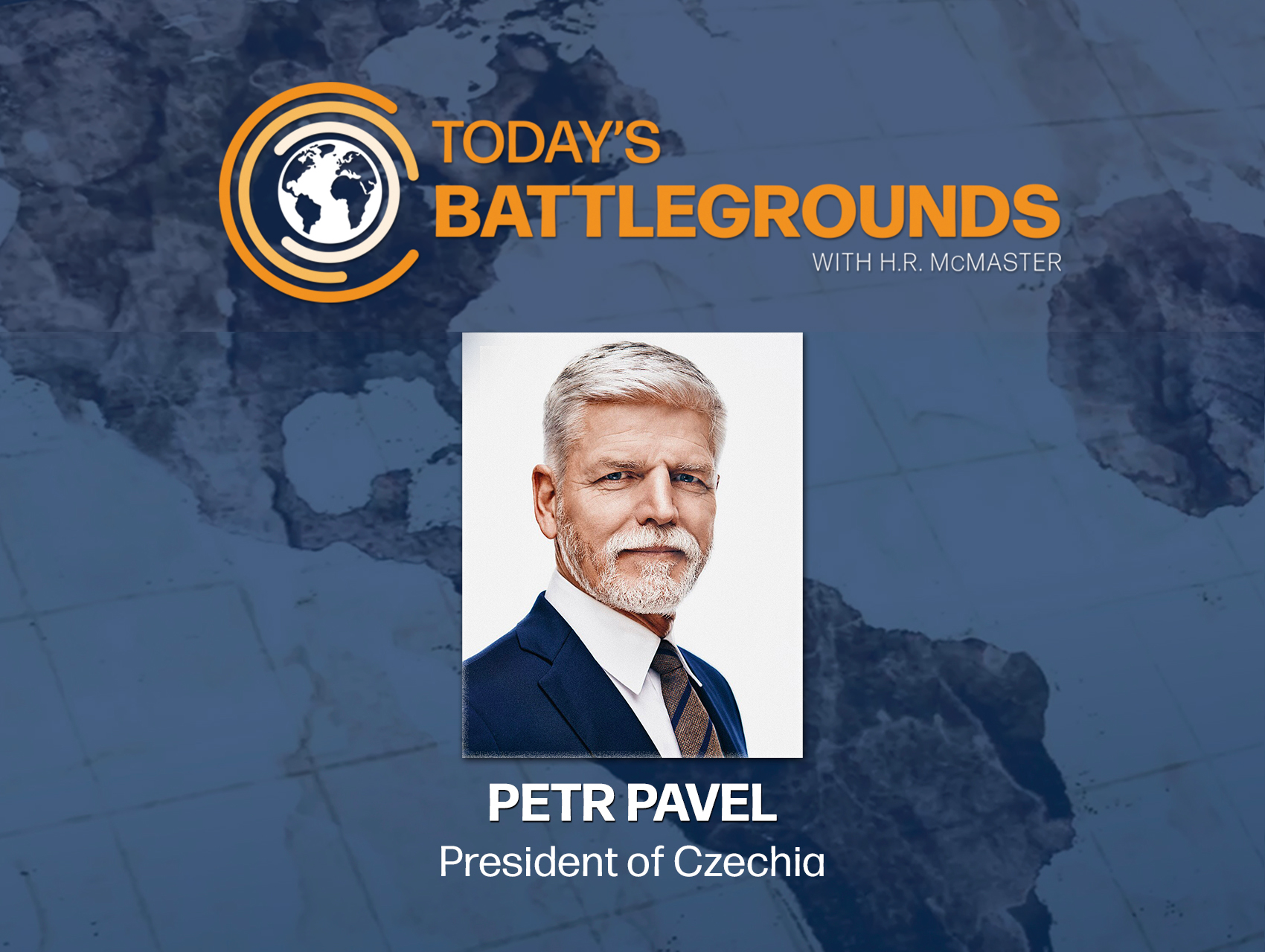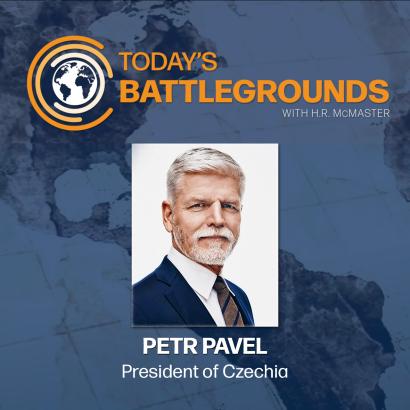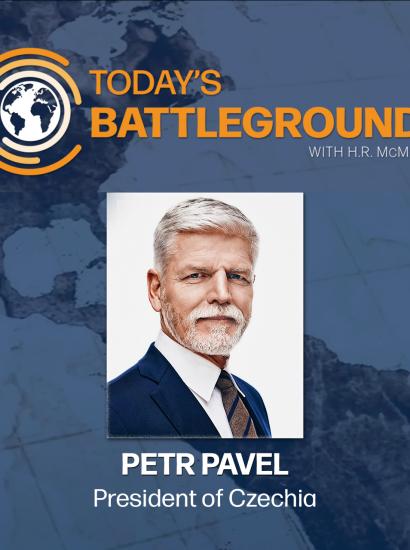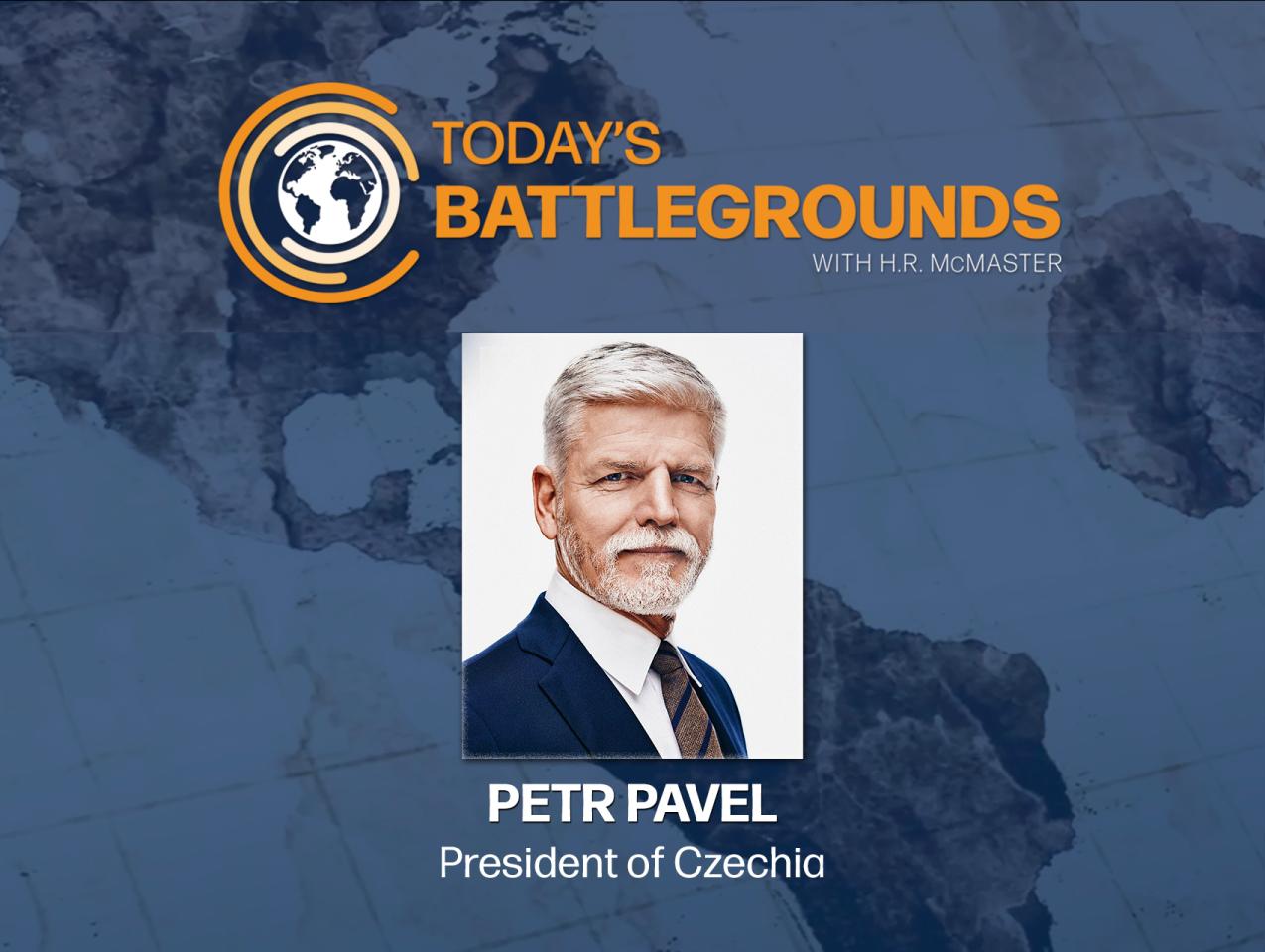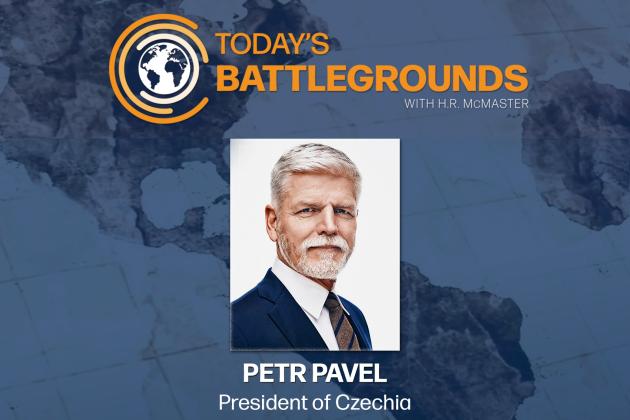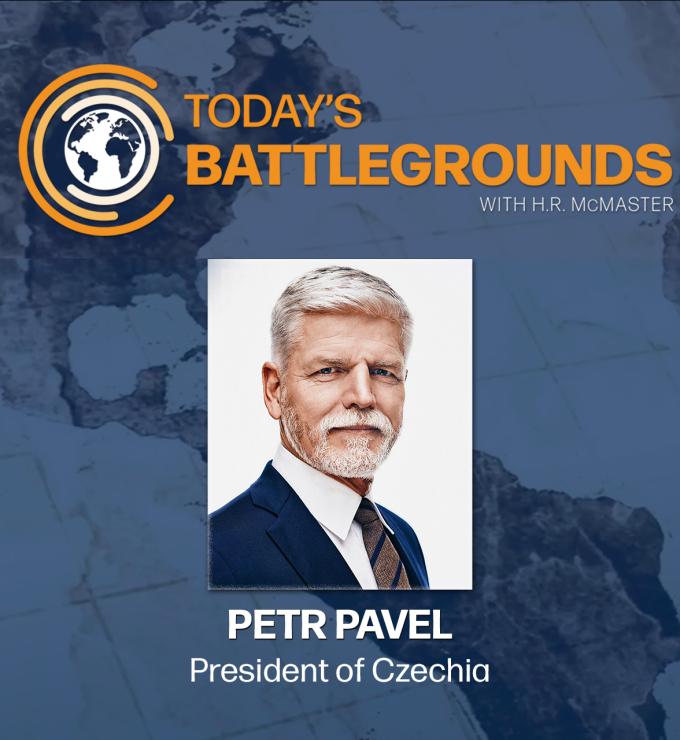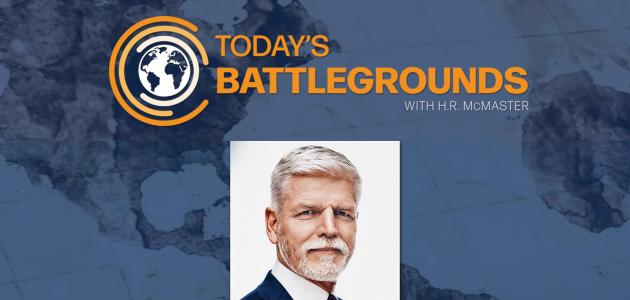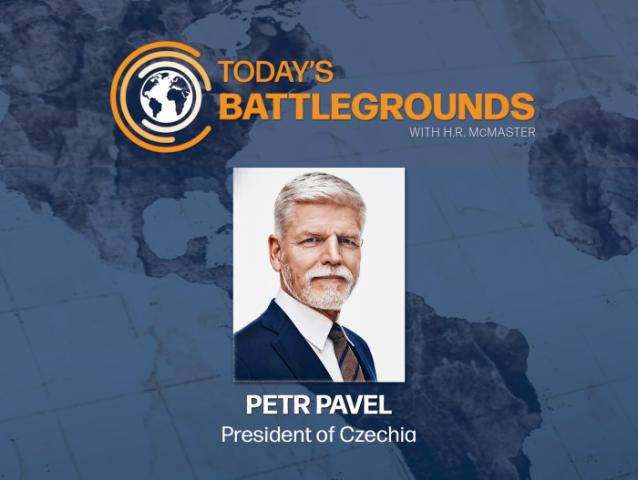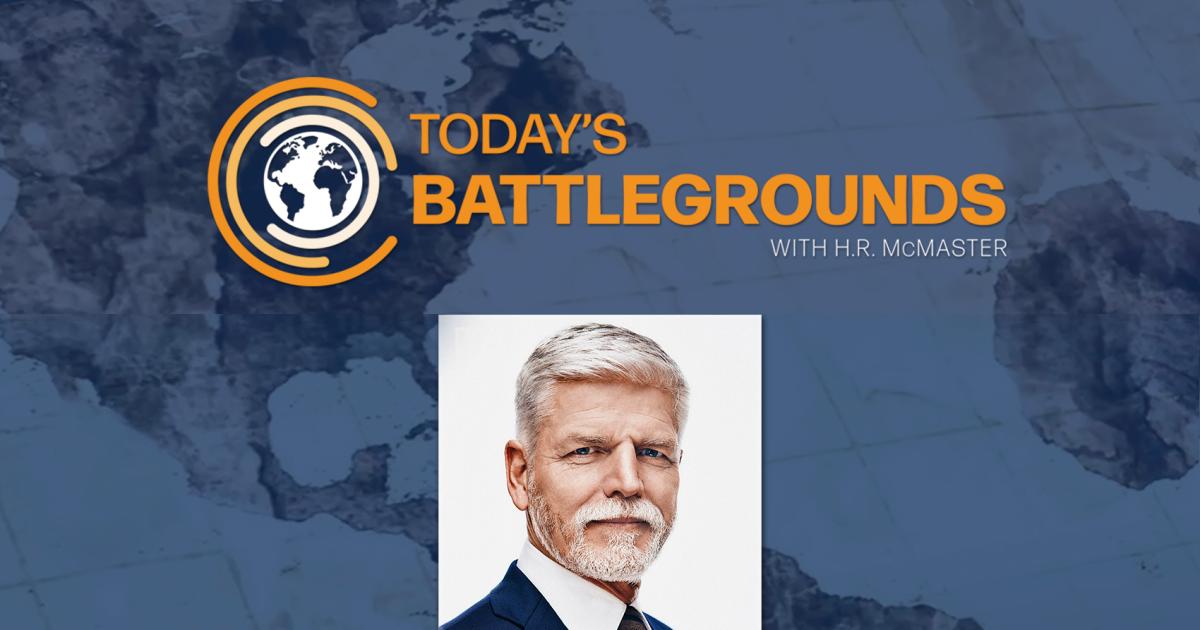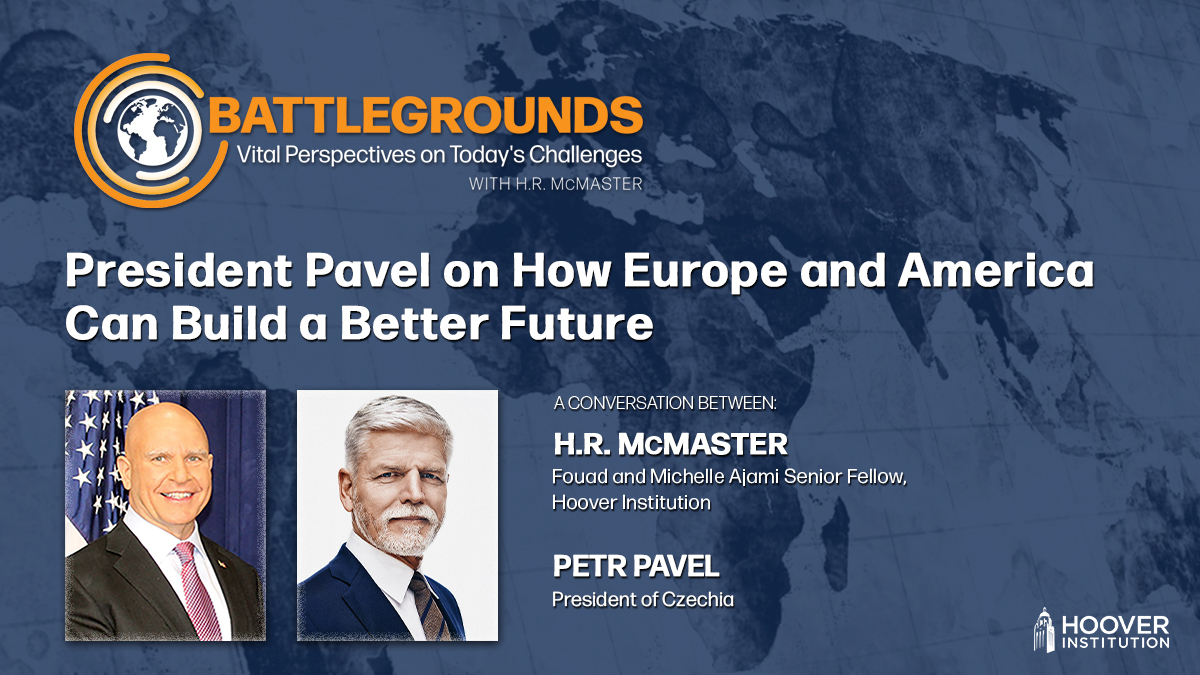- International Affairs
- US Defense
- Determining America's Role in the World
Join Petr Pavel, President of Czechia, and Hoover Senior Fellow, H.R. McMaster, as they discuss Czechia’s evolving role in European security, opportunities to restore peace to Europe and prevent future conflicts, and a vision of a positive agenda for a transatlantic relationship between the US and Europe. Reflecting on the importance of collective defense, Pavel provides his thoughts on the transatlantic response necessary to counter Chinese aggression and the shadow war Russia is waging against Europe, the crucial role the US plays in NATO, as well as the importance of the European Union to Czechia, what we can expect from Poland’s presidency in the Council of the EU and why Americans should be interested in European security.
Recorded on May 21, 2025.
WATCH THE VIDEO
>> HR McMaster: America and other free and open societies face crucial challenges and opportunities abroad that affect security and prosperity at home. This is a series of conversations with guests who bring deep understanding of today's battlegrounds and creative ideas about how to compete, overcome challenges, capitalize on opportunities, and secure a better future.
I am HR McMaster, this is Battlegrounds.
>> Presenter: On today's episode of Battlegrounds, our focus is on Czechia. Our guest is President Petr Pavel, a retired army general and former Chairman of the NATO Military Committee. President Pavel previously served as the highest ranking officer in the Army, Chief Chief of the general staff.
In 2022, Pavel ran for president as an independent nominated by citizens, since taking office in 2023, he has prioritized national security, European integration, and bolstering Czechia's role in global affairs. President Pavel graduated from the Army College in Vishkov in 1983 and holds a Master's from King's College London.
Modern day Czechia was originally inhabited by Celtic and Germanic tribes, Czechia has historically covered two major Bohemia to the west and Moravia to the east. Slavs arrived in the fifth and sixth centuries, and in the ninth century the Great Moravian empire rose as one of the first Slavic states in Western Europe.
Byzantine missionaries Saints Cyril and Methodius helped Christianize the region. Great Moravia declined in the 10th century, largely due to Hungarian incursions, which paved the way for the rise of the Kingdom of Bohemia as a prominent state within the Holy Roman empire. In the 15th century, reformer Jan Hus inspired the Hussite movement, which challenged Catholic orthodoxy in Czechia in 1618.
Protestant Czechs threw Catholic Habsburg representatives from a window in Prague. The act, known as the Defenstration of Prague, sparked the Thirty Years War, a war that resulted in 4.5 to 8 million deaths and caused widespread economic devastation. The Kingdom of Bohemia lost over a third of its population.
The war ended with the 1648 Peace of Westphalia, which established the principle of state sovereignty and built the foundation for modern Europe's international system. Modern Czechia remained under Habsburg control until the Austro Hungarian empire's collapse in 1918 at the end of World War I. 20 years later, the democratic First Czechoslovak Republic lost much of its territory to Nazi Germany after the United Kingdom, France and Italy, without Czechoslovak participation, signed the infamous Munich Agreement in an effort to appease Adolf Hitler.
The Czech people suffered under and resisted Nazi occupation from 1939 to 1945. Then in 1948, the Soviets pulled Czechoslovakia into its orbit as a member of the Warsaw Pact. The Soviet Union invaded and occupied Czechoslovakia in 1968 to crush the Prague Spring, a period of political liberalization and reform.
Approximately 200,000 Warsaw Pact troops and and 5,000 tanks extinguished the Liberty Movement, killing 137 Czechoslovak civilians and soldiers and seriously wounding 500. The Czech people endured censorship, brutal repression and economic stagnation. In 1989, Czechoslovakia peacefully transitioned to democracy in a movement known as the Velvet Revolution. On January 1, 1993, Czechoslovakia peacefully split into two independent countries, the Czech Republic and Slovakia, in what some called the Velvet Divorce.
The Czech Republic joined NATO in 1999, the European Union in 2004, and the Schengen zone in 2007. As of 2016, the Czech Republic's official English name is Czechia. The United States and Czechia have maintained strong bilateral relations. The Czech U S Alliance is anchored in shared values, a mutually beneficial economic relationship and close security cooperation.
We welcome President Pavel to discuss Czechia's evolving role in European security, the challenges of Russian aggression and doubts about the strength of the transatlantic relationship and opportunities to restore peace to Europe and prevent future, future conflicts.
>> HR McMaster: President Peter Pavel welcome to Battlegrounds. It is an honor to host you.
I've admired you for many years and our audience is in for a treat, I think. And thank you for joining us for this conversation.
>> Petr Pavel: Thank you, H.R. it's pleasure to be and especially to have such a dialogue with you.
>> HR McMaster: Well, you know, I'll tell you, I was having this conversation with you got me reminiscing about my service in the 2nd Cavalry Regiment, a regiment who had responsibility for patrolling the Czech West German border.
And, and I was serving in that regiment in 1989 when, when the Iron Curtain parted, the Berlin Wall fell and, and, and then our, our relationship, the Czech, US Relationship, you know, started anew. And what I'd like to ask you just from the beginning is to maybe reflect on your experience and your understanding and what you'd like to tell our audience about the US Czech relationship and how it's evolved over the years and how you see it today.
>> Petr Pavel: What a coincidence, HR that you mentioned the 2nd Cavalry Regiment because we were most probably watching each other over the border because I was at that time serving with our Special Forces. And from time to time we were monitoring the border and the movement of you guys on the other side.
It was quite interesting time, I have to say that I have started my military career in 83 after graduating from our military academy. And from there I went directly to Special Forces Regiment, I spent their time till 1989 when I joined gradual education. And I have to say that I didn't see it as something like turmoil or big rupture, it was mostly viewed as a smooth change, which was quite surprising given the fact that the regime was so tough for decades.
And for us in military, it was to some extent a relief because by the end of 80s, very few people actually believed that the regime has the capacity to survive. Many of us were frustrated by the lack of reaction to changes which were happening everywhere. Even in the Soviet Union and in Czechoslovakia, there were almost no changes whatsoever.
So the fall of the regime was a big relief to many and since then our biggest effort. And I'm glad that my predecessor, Vaclav Havel, was smart enough to recognize the need for us to be integrated. In European structures because he was convinced that remaining in a security void would be probably the worst of the options.
And that's why the efforts to make us ready for membership in NATO and lately in the EU started in early 90s, and I was lucky to be one of the first officers to be sent to the courses abroad. And actually my first was in early 90s, early 92 in the United States.
And I came to Washington DC through the main building, Dia and I spent there three months on a strategic intelligence course, which was a great eye opener to me. And since then we have done quite a lot of work to get ready for NATO membership. And I was really proud that we were able to prepare ourselves for membership in early 99.
And since then I believe that we proved to be a contribution and not a burden because we participated in all the operations, all the activities, we filled all our slots in NATO command structure and we were always trying to be a responsible ally.
>> HR McMaster: We're talking about a period of a tremendous geostrategic shift and for the good, I mean for all of our people.
My first trip behind the old Iron Curtain was to a small Czech town where our regiment had liberated the lipizhonr stallions to make sure they wouldn't fall into the of the Soviets were an old cavalry regiment and rode those horses back across into the allied controlled or the US controlled zone.
And we've seen some big shifts lately as well, right. And we thought at the end of the Cold War, maybe this was a period where great power, competition and rivalry was over, right? Where an arc of history had guaranteed the primacy of our free and open societies over closed authoritarian systems.
But of course, with the taking of power in Russia of Vladimir Putin and his pattern of aggression, I think we're in a new era in Europe. The first major land war in Europe, first major war in Europe since World War II is happening in Ukraine. It began in 2014 and we've witnessed the massive re-invasion and the destructive and horrible war since the re-invasion in February of 2022.
Could you share with our viewers your view of the current era and the big shifts that have occurred and what our response needs to be in terms of our Western alliance?
>> Petr Pavel: Well, let me start back in the 90s because at that time the perception was that we are now entering the era of no conflicts, no confrontation, just happiness and friendship everywhere, open borders, a lot of traveling and simply nice life.
Unfortunately, those who were more realistic, were very cautious about assessment of period as come a nice peacetime. Because they knew very well that Soviet Union and later Russia will not change so profoundly. And they were right, unfortunately. And as most of Central and Eastern Europe started meeting all the criteria for membership in NATO and EU or at least wanted to be partners and in good relationship to develop economic ties, political, diplomatic and many others, Russia remained mentally within the mentality of Soviet Union.
And it was clearly showed by Vladimir Putin when he came to power where he clearly said that his admiration to Soviet Union, to the greatness of that time, to the respect Soviet Union enjoyed in, at least in their eyes, that is something that they want back. And that's why we see now a resurgence of Russia as not global power, but definitely as a military power because otherwise Russia doesn't meet any criteria of superpower.
Definitely not by economy, not by science, even not by culture, which is a pity because Russia has produced a number of excellent writers, painters, composers and many others. But these people are not visible in Russia. What we see are rather propagandists, demagogues and very assertive or aggressive politicians who talk about animosities towards different European countries, who talk about the betrayal of all those countries who used to be members of Warsaw Pact.
And we also see efforts to redivide Europe to get back the control or at least the influence over the area of previous Soviet Union and Warsaw Pact. And when we listen to main figures of Russian regime, I think they are pretty consistent. When you look back in the Munich Security Conference 2007, Vladimir Putin was actually very precise in what he wants to achieve.
Our biggest mistake was that we were not listening and he was simply pursuing what he aimed for already in that time. So what we saw later on happening on vis a vis Georgia in 2008 or Ukraine 2014 was exactly in line with what he suggested years ago. And that's why I think we shouldn't be so surprised that Russia now wages aggressive war against Ukraine.
Because they are simply doing what they are talking about for a long time. And to us, what does it mean, that, no one who is sane in Europe would like to lead a war against Russia, no one wants to control Russia. They have so many own problems and deficiencies that they have to take care of them themselves.
What most lot of people in Europe want is to live and let live. Unfortunately, this is not mental setup that Russia understand. They either control or win or they lose, there is nothing in between. Russian mentality doesn't recognize a win-win solution, as they say in Russian, which means that if I am a general, then you have to be stupid and vice versa.
And I think this is clearly what describes Russian mentality today, where anyone who is reasonable enough would understand that there are good reasons and conditions for compromise over Ukraine. Compromise doesn't exist in Russian understanding. They at least have to understand the outcome of the war as their victory.
>> HR McMaster: =Mr President, I hope every American hears what you just said, because I think what you laid out so clearly. Is this fundamental misunderstanding about the nature of the post Cold War period and the flawed assumptions that we had? And this misunderstanding about what drives and constrains Vladimir Putin's behavior and the behavior of this hyper nationalist, jingoistic class of leaders that are in control of Russia.
What I've seen in recent years is this idea that Vladimir Putin just needs his security concerns allayed and then he'll change his behavior. But as you've laid out so clearly, he has aspirations that go far beyond anything in that's in reaction to what we do. And so therefore, it's important, I think, for us to defend ourselves against Russian aggression and to foil this objective that he has of reestablishing the Russian Empire.
Could you maybe share with our viewers how you see the ongoing war in Ukraine, but this broader kind of shadow war that Russia's waging against Europe and what's necessary in terms of a European, a Western transatlantic response to that aggression?
>> Petr Pavel: The question you have asked, HR, is really for a long analysis on, but I will try to make it shorter.
First, when Russia talks about peace, they talk about meeting their conditions, which actually is unconditional surrender for Ukraine and also failure of Europe. When Russia is talking about rearranging European security architecture, what they mean is exactly what Vladimir Putin presented as one of his conditions. Let's get back to 1997.
That means before and before the three Central and Eastern European countries were accepted to NATO, including Czech Republic. And I believe that clearly shows that what Russia wants is to restore the sphere of influence over part of Europe they have liberated after the Second World War, because they really understand the result of IALTA as the foundation of the order that they would like to see in Europe today.
And that's why I think whenever we talk about ending the war, we need to look at it from the position of Russia, which sees a part of Europe as their own territory, because Russian sees it in a way, we were dying for your freedom. We have liberated your country and now you are obliged back to us by loyalty and I would say no effort for autonomous decision making because you are to some extent ours.
That's how they see it. And Russian view of Ukrainians is even worse. Russians hardly saw Ukrainians as a nation with identity. Many Russians, even today, not just propagandists on TV, but quite often official figures and especially the leader of the team in Istanbul, he clearly pointed that Ukraine is actually no country.
It was always part of Russia and Ukrainians were some inferior to Russians because they call them Khokhols, based on the ponytail that they were wearing in the past as Cossacks. And that's why whenever they talk about peace in Ukraine, they present it in a way, we give you the conditions, you meet them, and then we will arrange peace.
But peace means what they say, demilitarization of Ukraine. So you have to get rid of all your weapons and all the capabilities to defend yourself anytime in the future. They want demystify Ukraine. That means get rid of your democratically elected government and allow us to install government that would be friendly to us, and give us a guarantee that you will never ask for membership in NATO or any other organization that would have a security foundation.
So they present themselves to be generous enough to allow Ukraine to become a member of the EU, but no security arrangement. This is obviously unacceptable for not only Ukrainians because they naturally feel that they are an independent nation with history, language, culture, but they also want to be a sovereign nation as any other nation in the world, to be able to decide on their own future.
And quite often, when I hear the argument even here in Europe, so let it be, let Ukraine cedes part of the territory to Russia, let them agree to the conditions, and we will have, finally, peace. Unfortunately, that's wrong, because if we push Ukraine to do it, and I would never suggest that we should, then Russia only would be encouraged that their approach was right.
That makes it right and in the future, sooner or later, they would do it against Moldova or Baltic countries, or any other, because that's simply their way of defending themselves from Russian tsars. They always were arguing that Russian territory is actually undefendable because it's too large. And that's why they only understand defense in securing areas that could be considered as a buffer, either by occupation or by arranging a framework like Warsaw Pact, which was actually no sovereign countries, but another form of buffer, protecting Russia from the West.
>> HR McMaster: This is so important, I think, for our viewers to understand. I mean, you've laid it out so clearly that really what Russia wants is to extinguish the sovereignty of these countries. And when they talk about the root causes, they're talking about their desire to subsume, really, Ukraine and then obviously to create the sphere of influence that replicates what they had under the Warsaw Pact or in the Russian Empire.
I'll tell you, Mr. President, what I've been really disappointed about, and I think many Americans have been, is the degree to which America has struggled to sustain its support in a predictable way toward Ukraine. And the degree to which there's been now skepticism about the importance of the transatlantic relationship and even the NATO alliance.
Could you maybe share with maybe Americans in particular, your perspective on the importance of US leadership participation? Occupation in NATO and the NATO alliance, as well as just in general in the transatlantic relationship and why Americans should be interested in European security.
>> Petr Pavel: I would start by saying that democratic countries, wherever they are around the globe, are natural partners.
Because we share the same values, we share the culture of negotiation and coming up to agreement based on mutual interest. I think this is a culture that brings us naturally together. And that's why I believe that the United States, Europe, but also Indo-Pacific partners are truly natural allies when we deal with aggressive countries like Russia, Iran, North Korea, or China.
And that's why, for me, it's always very strange to get into debate where someone suggests that the time of close links between North America and Europe are over, I don't think so. Obviously, Donald Trump's second term brought a lot of uncertainty into these relationships. His style, and I remember it firsthand when I first met him in the NATO summit, when he brought a kind of a shockwave into the room by declaring that who's not paying enough will not be defended.
And in fact, he delivered the same message as Barack Obama or George Bush before him, but they did it in a much more diplomatic way, talking about burden sharing and greater European responsibility. Regardless of the format of the message, the message was well received, and most of European allies started really paying much more attention to our own defense.
Right now, I believe that we are in a situation where it's well understood that for United States' biggest security challenge is not in Europe, it's not with Russia, it's with China. And naturally, so the shift, or center of gravity, of American foreign and defense policies moves from Europe to Indo-Pacific.
And we in Europe have to understand, and I believe that the vast majority understands it pretty well, that we will have to assume much more responsibility for our own defense. But the times of, I would call it, convenient reliance are over, that we simply have to rely on ourselves.
But it doesn't mean that we would rely on ourselves, and we will detach ourselves from United States. I believe that we would always prefer as close relationship as possible, but we understand that the priorities of the United States will be slightly different. For us, major security concern is Russia, but it should remain a serious concern for the United States as well.
Because when we see relationship developing between Russia and China, it's clear that you cannot detach one from the other. China is heavily supporting Russia in the war against Ukraine. And we can expect that if there is any issue related to China in South China Sea or around Taiwan, we can expect that Russia would be on Chinese side, so it's not separable.
And that's why I believe that we should think about it in a much more comprehensive way. European security is hardly distant from Indo-Pacific security. And even though European countries will not have probably ambition to act globally in the Indo-Pacific, we take care what is going on there. We are interested in having closest possible relations with Indo-Pacific democratic countries.
I have personally visited a number of them, not only in my position as chairman of NATO Military Committee but also as a president of Czech Republic. I am happy that they attend NATO summit because we can at least share with them their third perceptions and potential solutions. And we can also give a clear message to China and Russia that we have partners even in that region and we take care about each other.
And that's why I'm really very much concerned that we don't create any frictions between Europe and United States because they are not only unnecessary but they will be very harmful to both sides. And I would like to spread the message to current American leadership that we take very seriously the task of transferring a big part of responsibility for European defense to Europeans.
Including building our own strategic enablers, including having capacity to dual-head American positions in NATO command structure if necessary. But still keep a close link to United States for whatever operation will happen in Europe. But if United States needs to act anywhere in the world and will not have spare capacity for Europe, we should be able to do it ourselves, but always in close coordination with the United States.
This is how I think we can achieve what President Trump wants from Europe, to be self-reliant and good ally on European side of the Atlantic.
>> HR McMaster: Mr. President, this is a really optimistic and I share this view. I think this is what's going to happen is, as your country has led and you personally have led the shouldering of more of the defense responsibility.
I'm thinking about two years ago when we had this interruption of support for Ukraine and how you galvanized this effort to provide artillery, ammunition, and other capabilities that were essential for Ukraine's ability to defend itself. And I think that the points that you've made in terms of the axis of aggressors and Russia's relationship with China, but also North Korea and Iran.
What happens in European security and in Ukraine's security as part of that has huge ramifications for security around the world. And I think it's so important for Americans to understand that, but also to understand what you've done and what other European countries have done. I think thanks in large measure to, to your leadership and leadership of some other countries, like the Baltic states, like Poland, now the Nordic states, the UK Is, I think, really kind of stepping up.
Could you maybe explain to our viewers how you see Europe standing up to this challenge of sharing more of the responsibility for collective defense?
>> Petr Pavel: Well, we are just weeks from, Next NATO Summit in the Hague, in the Netherlands, where the expectation is that we will have an agreement on a significant increase of defense expenditure, which will be this time closely linked to achieving real military capabilities.
That means very closely related to NATO Defence Planning. And I think it's probably the first time we will do that in such a transparent way. We will not present to our people that we need to spend X percent for defense, but we need this amount of capabilities at this level of readiness, and this will result in such a cost, and this is what we have to do.
And I believe that we will have that agreement in the Hague. We will also have an agreement on how to strengthen European defense industry to have more capacity to produce what will be needed. But we will also talk about how to ensure greater coordination between NATO and EU, because EU has a broad spectrum of responsibilities for a number of areas.
But the EU clearly recognized that the task of collective defence is only exclusive to NATO. And NATO is really the backbone of European security, and everyone sees it in that way. And we understand that increasing our capacity for defense is not just about increasing spending in our budgets, but it's also about being able to run operation independently if necessary.
That means, really, to come up with own strategic lift, strategic intel, targeting strategic communications logistics, these were mostly in bigger operations provided by the United States. And I think it's fair to explain that actually, it's no surprise that these enablers were only available with the United States military.
Because none of the European countries fought any bigger war since the World War II. So most of our militaries were built more than small expeditionary force rather than a big war fighting force for classical war as we knew it in the past. So now we all understand that we need another set of these enablers to allow us to run a bigger operation only by European countries.
And I believe that we can easily, once we have that agreement between United States and other European allies, that there will be some transition period in terms of responsibility for defense in building up new capabilities that don't exist in such an extent at this moment. We can easily give clear tasks to our military planners to include this transition into standard NATO Defense Planning.
And that means, that in such a case, it will become a standard process of our planning, and we will have the task clearly articulated for every country year by year. And there will be a transparent way how to do it over a reasonable period that will be ambitious enough to accommodate the US needs to free your hands.
But that will be also realistic in terms of acquiring sufficient resources, both human and material, here in Europe. I think it's manageable, we can do it, provided that we are able to openly communicate it and get an agreement on timeline.
>> HR McMaster: Mr. President, I really appreciate that perspective.
I think it's important for Americans and our international audience to understand how Europe really is stepping up now. I mean, maybe because of the, as you mentioned, the shock effect of President Trump. But I think it's also important for the United States to remain committed, obviously to NATO, and to leading, because there's no really obvious other nation to, I think to lead NATO to galvanize the alliance.
And so while it's important, I think, for all nations under Article 3 of NATO to provide for these defensive capabilities. I think it's also important not to undermine the psychological strength of NATO. Would you mind sharing with our viewers your view of the importance of the transatlantic relationship, and the importance of the US role in NATO?
>> Petr Pavel: I believe it's absolutely crucial, and it's not just a cliche. And if we accept that for Europeans, the biggest security threat is, and for foreseeable future will be Russia. And if we accept that Russia only understand the voice of power, then the best weapon to prevent the war in Europe was deterrence, and deterrence is only efficient when it's credible.
And this deterrence was credible mostly because of US capabilities, starting from the biggest deterrent, and that is a nuclear umbrella. And then, of course, all the capabilities, including all the enablers, and with coordination with all European countries, the power that was simply not negligible for Russia, they had to respect it, and they did.
If Russia sees now United States to some extent melting this relationship by pointing to the fact that American forces will withdraw from Europe, United States want Europe to take about their defense themselves. If Russia sees any friction in between two sides of the Atlantic, they might be very much tempted to use the opportunity.
I believe it's definitely not in the interest of Europeans, and I also believe that it is not in the interest of Americans. And that's why I would urgently call for continuing very good debate as allies producing good, solid plan how to reduce American burden when it comes to European defense.
How to increase our burden, but do it in a way that would leave to Russia no room to even guess that they would now have it easier with us than they had it up to now.
>> HR McMaster: I think, to make the case on the importance of NATO, I think one of the things you could look at is, how desperate Putin is to try to break it apart.
And I think the same could be said maybe about the European Union as well, there's been a tendency here, Mr. President, to view the European Union as a competitor, an economic competitor in particular. Could you maybe talk about how you see the European Union, its role, the importance of the European Union to your country, but also maybe what to expect in the near term?
Term as well as Poland takes over the presidency of the EU and has chosen a theme that's related to European security.
>> Petr Pavel: There are sometimes suggestions that there is a competition in division of labor between NATO and EU. I think there is no competition whatsoever because NATO was clearly designed as a tool for collective defense.
EU was designed as a community which was mostly economic, financial. And even though the scope of responsibilities of the EU grew over time, now it covers almost all spheres of our lives, with the exception of collective defense. European Union has its own security and defense policy, but the main task of these policies is cooperative security.
That means cooperation with partners around Europe and crisis management. No collective security. What the EU can do for security in Europe is facilitate the process, provide financial tools for funding of defense, providing tools for better integration of European defense industries. Providing methodological assistance to countries when it comes to increasing their own capacities, increasing resilience of countries against non-traditional ways of war, such as hybrid cyber.
So all these capabilities can be and are coordinated within the EU. So in that sense, NATO and EU are complementary. And we see from time to time some deficiencies in communication caused by the fact that both institutions, at least in some areas, work on the principle of unanimity.
NATO clearly is based on unanimous decision making. EU when it comes to most important decisions, work on unanimity as well. And especially to those very limited areas, we will see their defense. But having some countries in Europe still in trouble with each other, I would mention Turkey, Greece, Cyprus, they usually block some decisions that would lead us to much closer coordination between the two organizations.
But now I believe that with all the pressure that we see from Russia, it is a security pressure, with all the pressure that is mostly economic, sometimes political, from United States. Europe will finally understand that the times of quarrels will have to stop, that we really have to understand that there is one unifying purpose, and that is European security, which will have to lead us to some compromises that will allow us to be much more efficient than we were up to now.
>> HR McMaster: President Pavel, you started by talking about the common principles that we hold between the United States and Europe. And what I'd like to ask you is what do you see as an agenda for the United States and the European Union, the United States and Europe broadly? I'm thinking about the Draghi report.
I read President Nunistu's speech that he gave at Chatham House from a defense perspective, it sounds like Donald Trump's priorities to me in terms of deregulation and economic growth and energy security. And could you maybe lay out your vision for a positive agenda for the transatlantic relationship in the US And Europe?
>> Petr Pavel: I would probably start with one example that was mostly visible in the last weeks and months, and that is tariff wars. I hate that expression, but it created a lot of disturbance around the globe. But I believe that when I was listening to President Trump about inequalities in mutual trade between the United States and Europe and the need to impose tariffs, I thought to myself, why don't we talk before?
Because if we have any sense of imbalance, then friends would sit down and discuss it. And I still believe that we are friends. So I am glad that right now there are negotiations how to set this balance right. And then of course, we should rather spend our time on inventing the ways, how to remove the barriers instead of imposing new.
Because by removing barriers, we can unlock potential that is still both within Europe, inside, but also in between Europe and United States. And by working more together, we can actually get much more. Because by simplifying the exchange of goods, simplifying the exchange of scientists, bringing together research teams from all the areas.
I believe that it will bring benefit to both United States, Canada and of course Europe as well, because our systemic rivals are not in the United States. Our systemic rivals to both of us are in China, Russia and other countries, but especially in China, because China is an extremely complex actor that we have to deal with.
It is at the same time economic partner, but it's also a systemic rival. But it can also be a challenge because China is becoming more and more assertive and it will be a challenge to United States as it will be the challenge to us. So I think for United States and Europe, it will be much smarter to work together to provide sufficient counterbalance to China and Russia and not to make them happier by having conflicts in between us.
>> HR McMaster: Hey, Mr. President, I couldn't agree with you more. I think it is so important for us to recognize the degree to which this axis of aggressors is working together, trying to break us apart. I'd like to just ask you one final kind of related question to that.
You alluded to what we've called for many years Russian new generation warfare, political subversion. China is involved with this as well, right? With their Wolf Warrior diplomacy. The degree to which they're, they use, you know, various platforms like TikTok to try to which a form of cognitive warfare.
And so there's this tension, though, that you saw manifested in Vice President Vance's speech, for example, in Munich between countering this sort of political subversion and the issue of free speech. You see it playing out as well with really some of the emergence of certain political parties in Europe and debates about whether or not to ban certain parties.
How do you see this tension between cyber enabled information warfare and political subversion and the important. Importance of free speech, how do you reconcile that tension?
>> Petr Pavel: When I started with Russian new generation warfare, whose beginnings are somewhere in 2010 when we saw it first times, and then it was somehow attached to General Gerasimov.
It always talks about what the Russians call linear warfare, linear conflict. Unlike us who distinguish between peace, crisis and war. For Russia, history seems to be a one continuous conflict where only tools and intensity changes over time. And that's why they actually see the situation which we consider at worst as crisis, they see it as a conflict, and they use tools that they deem appropriate for this phase of a conflict.
So for them using what they call active measures, that means it's espionage, suppression and all kinds of psychological cyber and other warfare. Is perfectly legal because it fits into their vision of toolbox for appropriate part of history. That's why we face so much now, all kinds of cyber attacks, political suppression, interference into legitimate political processes, including elections.
But they also do quite a lot to divide us, to erode societies from within. Russia learned that lesson from the Cold War. If you are not strong enough as your opponent, you have to make him weaker, not your stronger. Because if you can't make yourself stronger, it's always better to weaken your opponent.
That's what they are doing. They are using all the tools they have available to weaken us through political disruption, through different hybrid attacks, through cyber attacks, are very good in exerting their influence. Not only individually tailored to countries, but also tailored to individual groups. They are addressing day by day with their propaganda specific groups, they are using very skillfully social media.
In fact, the invention of the West is now being turned against the West. Because what Facebook did in the beginning with dividing society into small bubbles, because it was motivated by good advertisement that was tailored to group of specific interest. Now, what Russia is doing, they are selling propaganda to these bubbles very skillfully.
And we haven't learned so far how to face it efficiently. We don't do the same to Russia, we are not that efficient in presenting our ideas to Russian population to make them aware that we are actually no enemies. But they are so well managed by their own propaganda, that they are almost 100% sure that we are the enemies.
And many people in our countries tend to believe that Russia actually is no enemy, for China it's very similar. China wants to present itself as economically strong, scientifically strong country with a long history and culture which is friendly, which only wants to make good business with everyone. And they are supporting universities, they are supporting number of institutions to improve international relations with just one purpose, to create a generation that will be much friendlier to China.
That will not understand the foundations of China as a centrally organized country, with a very tough ideology which is not friendly to democracies.
>> HR McMaster: And a Leninist state-.
>> Petr Pavel: Yeah.
>> HR McMaster: That lionizes Stalin, right? Exactly.
>> Petr Pavel: And for Russia, it's the same. What Russia is doing, they say from the beginning, this war is not our war, it's the war initiated by the West, who only uses Ukraine as a tool.
Because you want to destroy Russia, and that's why you are using all opportunities to harm us. We only defend ourselves, their population, believe it. And number of people in our countries, in Europe and potentially even in United States have a tendency to believe that there might be some truth in it.
That means that the Russians are actually not so bad, they don't want to harm us, but we are trying to harm them. What we have to do is obviously on one hand, taking all technical measures to protect ourselves against malign influence. Not by censorship, but rather by showing our people that they have to look for the sources of information that are trusted, that are not propaganda sources with no credibility whatsoever.
We also have to protect our electoral system. For example, you mentioned JD Vance. I was sitting in the room where he created some wave of surprise, talking on elections in Romania. But what is clear that Russia created tens of thousands of fake accounts, and fill them through AI with malign contents.
And giving the algorithms of social media, this malign content pushed out all natural content and created an atmosphere in which candidate picked up by Russia was suddenly growing in a fast pace. And within two weeks he raised from 5 to 25%, which is not normal under normal conditions.
So on one hand we have to protect ourselves against this abuse of social media, but we shouldn't restrict in no way freedom of expression, freedom of speech, because otherwise we would compromise our own foundations. But we have to take many more measures to really be successful in this new way of war fighting.
>> HR McMaster: Yeah, I think the first step is to educate people, ourselves about the nature of the threat, and you've just done that with such a high degree of clarity. Especially this idea, that the aggressors try to portray themselves as the aggrieved and you try to use this term accurately.
And there are useful idiots, in Western societies who bought Buy that and who buy into that kind of that deception. Mr. President, you've been so generous with your time, I wanna ask you one last question. You have a long career of distinguished service to your nation, to humanity for our young viewers in particular, could you maybe share your thoughts about the ethics and rewards of service, why you chose the path you did?
And what you've experienced and in terms of the rewards of serving as a military officer and serving as the leader of your country?
>> Petr Pavel: I will start with something that is still perceived as sensitive in my country because I started my military service under communist regime. And some people tend to present it as anyone who joined military at that time was active supporter of bloody communist regiment.
When I joined military, my views were much more idealistic, I simply wanted to protect those who were weak, I see it as three musketeers or many other romantic figures where I would do something for the others. And my only idea was to get to paratroopers and to do the job that no one else would dare to do, so it was quite romantic.
And when I was trying to explain my soldiers what is the real reason for us to serve in the military? And they were taught by that time, political leaders about the patriotism and loyalty to Communist Party. I told them these are just words, if you go to combat, who would you think about?
It wouldn't be a Communist Party, it wouldn't be a Prague Castle with the president, it will be your family, your friends, your way of life, places you love. And that brought me to military service, and over time, when the system changed and I continued my service and I was asked if I changed my coat, I said no, I didn't.
I still serve to my people, I will still protect those I love, the places I love and the way of life I love. And when we later joined NATO, or even before, when we were in operations in ex Yugoslavia, still as partners to NATO, not allies. And we got into operation where we were trying to save French soldiers from combat zone, and I was asked, why would you do that for foreign soldiers?
And I said, because of solidarity, I would expect them to do the same for me, and so it extended the scope of people that I was ready to protect from those I love, from those who I saw as my friends and allies. So that was basically my motivation for service, and when I'm serving my nation from this position, I again see it as a service.
I am not a politician by born, I was most of my life professional soldier, but I even see a political position as a service to the nation, and this is my basic approach.
>> HR McMaster: Well, Mr. President, I think what you're talking about is kind of a sense of honor, right?
A willingness to sacrifice for your fellow citizens and for humanity, and I'm really inspired by your story, it's wonderful to host you here. I have this fond memory of going to the Czech Staff College with all of our officers from our cavalry squadron in Germany and doing a staff ride together on the battlefield of Australas.
And Prague is my favorite city in the world, and I would encourage all of our viewers, if you have not been, you've got to go, and you have to stand on the St. Charles Bridge at dawn to really get the full effect. But, Mr. President, thank you so much for the honor of being with you.
And thank you on behalf of the Hoover Institution and our viewers for helping us learn so much about the challenges and opportunities we're facing today so we can work together to build a better future.
>> Petr Pavel: Thank you very much, HR thank you for inviting me, and if you have a trip to Prague, just give me a call and I will invite you for coffee with nice view over Charles ridge.
>> HR McMaster: Thank you Mr. President, what an honor privilege to be with you.
>> Petr Pavel: Thank you.
>> Presenter: Battlegrounds is a production of the Hoover Institution, where we generate and promote ideas, advancing freedom. For more information about our work, to hear more of our podcasts or view our video content, please visit hoover.org.
ABOUT THE SPEAKERS
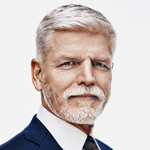
President Petr Pavel is a retired army general and former chairman of the NATO Military Committee. President Pavel previously served as the highest-ranking officer in the Army, Chief of the General Staff. In 2022, Pavel ran for president as an independent nominated by citizens. Since taking office in 2023, he has prioritized national security, European integration, and bolstering Czechia’s role in global affairs. President Pavel graduated from the Army College in Vyškov in 1983 and holds a Master’s from King’s College, London.
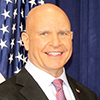
H.R. McMaster is the Fouad and Michelle Ajami Senior Fellow at the Hoover Institution, Stanford University. He is also the Bernard and Susan Liautaud Fellow at the Freeman Spogli Institute and lecturer at Stanford University’s Graduate School of Business. He was the 25th assistant to the president for National Security Affairs. Upon graduation from the United States Military Academy in 1984, McMaster served as a commissioned officer in the United States Army for thirty-four years before retiring as a Lieutenant General in June 2018.







